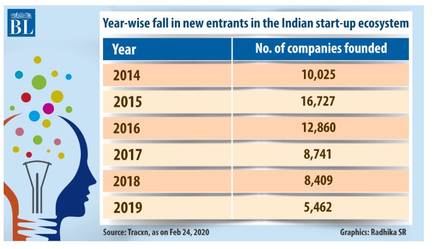Start Ups

Figure 3: No Copyright Infringement Intended
Context:
- India has added 33 ‘unicorns’ in a single year as per the Hurun Report.
- This has helped India displace the United Kingdom (U.K.) to be third in the list of countries hosting unicorn companies.
About Unicorns:
Unicorns are enterprises valued at more than $1 billion.
Reasons for Growth of Startups
Indian Market Size:
- With a GDP growth of 7.0 percent in 2018, India is one of the fastest-growing large economies in the world.
- In a country with a population of nearly 1.3 billion people, even niche products can have significant market potential.
Rising Consumption:
- Rising consumption is driven by the growth of upper-middle income and high-income segments of the population, which will grow from being one in four households today, to one in two households by 2030.
Demographic Dividend:
- Half of the country’s population are below the age of 25 years and the youth is aspirational.
- The nearly 700 million people born through the late 1980s to the 2000s carry material ambitions and have the ability to spend and make those goals a reality.
Role of Diversity:
- If Startups solutions are successful in addressing the needs of diverse customers pan-India, they can likely find market uptake in other geographies such as Africa and Latin America, and even the developed world.
Export Potential:
- Indian startups often do pilots and serve customers in the United States, where the user base has a much higher ability to pay.
Increased Technology Penetration:
- Over the last few decades, technological change has reduced the cost of building digital products and has provided access to consumer markets.
- As India improved its digital connectivity, market access barriers have been brought down.
- The broadband penetration is increasing fast and the number of wireline subscribers in 2018 is expected to increase by 44 percent over the next four years.
- The Aadhaar biometric ID system, introduced in 2009 and assigning Indian residents a unique identity number, has made it easier for companies to validate information about their customers.
Increased Political Will:
- The federal as well as some state governments increasingly recognise startups as important engines for economic growth.
- Government has launched Startup India to build a strong ecosystem that is conducive for the growth of startup businesses, to drive sustainable economic growth and generate large scale employment opportunities.
Changing Perceptions towards Entrepreneurship
- Most startup founders in India have strong intrinsic motivations and report being driven by their passion, curiosity, satisfaction that comes from problem solving, and desire to make a difference in society.
- Some founders have become India’s “startup heroes”, contributing to a current image of entrepreneurship as “cool” and “glamorous”.
Challenges
Diversity and the Digital Divide
- In general, an information gap exists between those who provide solutions and those who are supposed to use them.
- Most startup founders are well-educated and come from well-off backgrounds in urban metro cities. However, as nearly 70 percent of the Indian population live in rural areas leading to disconnect.
Taking Products to Market and Low Willingness to Pay
- startups are at a disadvantage compared to large companies. On the one hand, this is due to the fact that big market players are more capable of dealing with bureaucratic regulations.
- public procurement is seen as weak and government prefers to sign contracts with established companies.
- communication with and retention of customers takes time and effort. Convincing Indian customers is difficult, especially if the startup develops innovative products and caters to new market segments.
Hiring Qualified Employees
- the majority prefer to work for large corporations, which promise more stable jobs.
- In addition, startups can rarely compete with the reputation and compensation structures which large companies can offer.
- many job applicants are not sufficiently skilled. Startups see a gap between the knowledge taught to students in colleges and the knowledge needed for the jobs, especially in sectors in which technologies change at a fast pace.
- Significant number of highly qualified specialists move abroad for jobs. At the same time, and in contrast to many other startup hubs globally, Indian startups are yet to attract international talent.
Complex Regulatory Environment
- Startups in India often feel encumbered by bureaucratic processes, which appear to lack underlying standards.
- They have insufficient possibilities to find information, and there is little planning security about how long processes can take.
- Despite government’s declared intention to hasten the setting up of a business, the process is generally described as lengthy and costly. It requires many approvals, constituting a high entry barrier.
- Some startups fail, but closing down a business was described as even more difficult than setting it up.
Way Forward:
Changes in Culture:
- changes in the broader cultural milieu would be helpful to encourage people taking risks and possibly developing impactful solutions.
Economic Reforms:
- Policy reforms improving general economic conditions as well as investments in digital and physical infrastructure (for instance, internet connectivity, roads and public transportation, power and electricity), are expected to also benefit startups.
Integration with College Curriculum:
- There is a need for integration of entrepreneurship courses in college curricula, which would better prepare students for careers in startups.



1.png)
